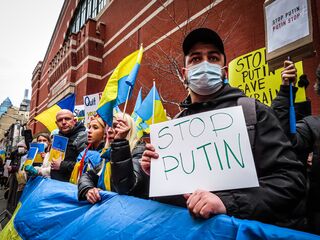Law and Crime
What Is Genocidal Consciousness?
A Personal Perspective: What are the historical precedents for Putin?
Posted March 7, 2022 Reviewed by Lybi Ma
Key points
- The claim that Ukraine is in need of denazification baffles the imagination.
- Putin’s actions in Ukraine seem similar to that of Hitler's.
- This is a Russification of eastern Ukraine that will leave the western half a rump state.
I was recently asked what are the historical precedents for Putin’s attack on Ukraine?
When I contemplated this question I was initially at a loss. After all, reasonable experts thought Putin was just bluffing and looking for a deal when he surrounded Ukraine with 150,000 troops, despite the claims US intelligence was making. After the invasion, I spent two days shocked and fighting back tears thinking about kids and grandmas taking up arms. Clearly, Ukraine posed no “real” threat to Russia, nothing justifying a war on them. Why would he attack them? What are his motivations?
I thought of the second world war. I rarely make comparisons to Hitler because his actions always seemed unprecedented. A somewhat unique form of madness. But Putin’s actions in Ukraine strike me as similar.

It is clear over the last decade, and more importantly in the last few years, Putin has successfully turned Russia into a full-on dictatorship. Similar to Hitler, he is a dictator for life. Rudolf Hoess, Hitler’s chief of staff commented in the 1934 propaganda film The Triumph of the Will, “Hitler is Germany, Germany is Hitler.” The same has been said of Putin. In 2014 the head of the Russian Duma stated, “As long there is Putin, there is Russia. Without Putin, there is no Russia.” The parallel is striking. Also, in the last eight years, Putin has been successful in taking over the state and society in much the same way Hitler did in the 1930s. The press, the judiciary, and political elites have either been cowed, poisoned, imprisoned, or forced into exile.
The similarities don’t stop there. After Stalin and Hitler divided up Poland and much of eastern central Europe in the Molotov Ribbentrop pact in August of 1939, Hitler claimed that Poland did not have the right to exist as a state. As he said to his army commanders in August 1939:
‘I have issued the command our war aim does not consist in reaching certain lines, but in the physical destruction of the enemy. Accordingly, I have placed my death head formation in readiness …with orders to them to send to death mercilessly and without compassion, men, women, and children of Polish origins. Only thus shall we gain the living space, which we need. Who, after all, speaks today of the annihilation of the Armenians?”
This has long been considered by historians a reflection of Hitler’s genocidal mentality. Subsequently, Putin’s denial of the very existence of the state of Ukraine, as a mistaken creation of Lenin, puts him on par with Hitler’s genocidal mentality. He is also committing war crimes whilst invading an independent state. These types of crimes haven’t been experienced in Europe since Hitler.
Putin claims he is sending in peacekeepers and accuses the Ukrainian government of "genocide," and promises "denazification" after conquering the country. There is no genocide in Ukraine, and is there any evidence to his claims? But more importantly, his intent appears to be just the opposite: waging a war will destroy the Ukrainian state. He plans on a Russification of eastern Ukraine that will leave the western half a rump state that he can later destroy once he has consolidated power in the east. This is genocide in process.
Also, the claim that Ukraine is in need of denazification baffles the imagination. It seems absurd. The president of Ukraine, Volodymyr Zelenskyy, is a Jew with moderate political views. His grandfather fought the Germans in the Red Army; his grandfather's family was murdered in the Holocaust. He was elected with more than 70 percent of the vote by citizens of a multicultural civic society. The far-right gets less than 3 percent of the Ukrainian vote and plays no role in government.
I think Putin is likely a postmodern dictator where words have no meaning. In Putin’s doublespeak the concepts, Nazis and genocide, are turned on their head. Perhaps Putin is turning to Hitler and the second world war to provide a historical precedent. Putin can’t be like Hitler because he is stopping genocide in Ukraine, because he is preventing genocide with his peacekeepers; Putin isn’t a fascist like the Nazis because he is denazifying Ukraine.
There is another way that Putinism employs postmodernism with this mythical version of the past. Once again this version of the past concerns the previously mentioned Nazi-Soviet pact. The division of Poland and Eastern Europe has been a difficult memory to incorporate for both Germans and Russians. But recently in Russia, the denial has become surreal. In 2016, the Russian Supreme Court upheld the conviction of a Russian national, for saying that Nazi Germany and Soviet Russia had cooperated and attacked Poland in 1939.
This is a simple historical truth. But this truth has been turned into a crime; today it is crime to speak of war in Russia. This “truth” has also been denied in Russia’s official historical policy. The official narrative is the Molotov-Ribbentrop Pact is a triumph of Soviet diplomacy. Thus a diplomatic crime of state destruction is turned into a triumph. This also obscures that the pact led to the destruction of hundreds of thousands of Poles, including 14,000 Polish reserve officers (priests, lawyers, intellectuals, teachers, the elite) who were murdered by a shot to the neck by the Soviets. This crime is the Katyn massacre and was not admitted to by Russia until 1990 by Mikhail Gorbachev. But many people in Russia still deny it.
Another specific comparison with Hitler is Putin’s mythical concept of history. In Putin’s version, God announced that the Ukrainians and Russians became one people when the Viking leader Vladimir was baptized and converted to Christianity a thousand years ago and returned to Kyiv. Hitler’s myth was that the Germanic tribes were superior because they came from ancient Aryan peoples. When history becomes myth the past becomes a smooth fable, the actual complicated “real” past is lost to the myth. Like Hitler, Putin seems to use a mythical version of the past to justify his right to the domination of other peoples and to ultimately commit genocide.
But there is a difference between Hitler and Putin, it places Putin in a category similar to Stalin. When Hitler destroyed states he had either killed the leaders or they had fled. He imposed his puppet rulers. It appears that Putin plans on applying Stalinesque show trials in Ukraine. Throughout his reign, Stalin used show trials to control would-be rivals in Russia itself and leaders in the satellite states of Eastern Europe.
Under Stalin, these trials always took the same form. The accused were charged with having done things and said things they had not, on the basis of forced confessions, or they were blamed for things that they had done but to which new meanings were attached. This kind of show trial seems to be behind Putin’s desire “to bring to court those who committed numerous bloody crimes against civilians.” This not only undermines the international criminal justice system but makes a charade of justice since it is Putin and his army that are committing the crimes. If Russia is able to capture the political and civic leaders in Ukraine it appears they will be put on show trial.
But that is a big if. There were 2.3 million Soviet soldiers on Ukrainian soil after the second world war. Under those conditions, Ukraine was quickly absorbed into the Soviet Union. But it is clear that the Russians don’t have the forces to take absolute control of Ukraine and can expect a long-term insurgency. This will be remembered as Putin’s war and perhaps like Hitler’s decision to declare war on the United States, his greatest mistake.




